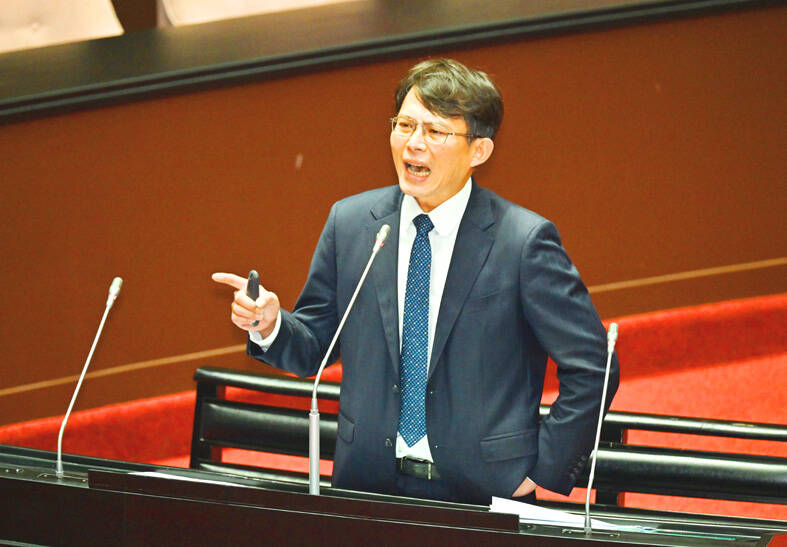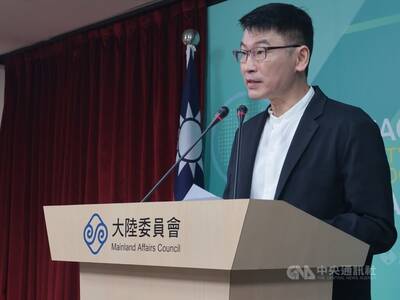The Executive Yuan must do more to prevent Taiwanese companies or foreign countries from importing or exporting goods that are not correctly labeled for origin, as products falsely said to be “Made in Taiwan” might benefit Chinese firms, while also undermining national security, Taiwan People’s Party Chairman Huang Kuo-chang (黃國昌) said at the legislature in Taipei yesterday.
Hi Sharp Intelligence (昇銳電子) has been accused of importing Chinese-manufactured surveillance equipment and relabeling them as “Made in Taiwan,” despite repeated assurances that 100 percent of its products are manufactured locally, Huang told Premier Cho Jung-tai (卓榮泰) during a plenary session.
“The company styling itself as the poster child for the nation’s surveillance security systems industry is, ironically, the one labeling goods manufactured in China as made in Taiwan,” Huang said.

Photo: Tien Yu-hua, Taipei Times
Hi Sharp’s equipment is used in public transportation and infrastructure in Taiwan, including the high-speed rail and other railway systems, Taiwan Taoyuan International Airport MRT and by Taiwan Power Co, he said.
The Executive Yuan must have a screw loose in its oversight mechanisms, he added.
What is the Executive Yuan doing to make sure the 2021 ban on imports of Chinese-manufactured information technology products is enforced? Huang asked.
In light of the US’ recent tariff policies, Taiwanese products might face increased obstacles entering US markets if components are made in China, Cho said, adding that Taiwan must police itself.
The Executive Yuan would look into the matter and would launch reviews and issue punitive measures when necessary should any illegalities be found, he said.
The Executive Yuan would deliver a report on the matter within two weeks, Cho said.
The National Development Council and the Ministry of Economic Affairs also said that they would launch investigations into the issue.

ENDORSING TAIWAN: Honduran presidential candidate Nasry Afura said that Honduras was ‘100 times better off’ when it was allied with Taipei The Ministry of Foreign Affairs yesterday said it would explore the possibility of restoring diplomatic relations with Honduras based on the principle of maintaining national interests and dignity. The ministry made the remarks in response to reporters’ questions regarding an article titled: “Will Taiwan Regain a Diplomatic Ally?” published in The Diplomat on Saturday. The article said Honduras’ presidential election in November could offer Taiwan the chance to regain an ally, as multiple candidates have promoted re-establishing diplomatic relations with Taiwan. Honduras severed diplomatic ties with Taiwan in March 2023 in favor of Beijing, but since switching its diplomatic recognition,

A fourth public debate was held today about restarting the recently decommissioned Ma-anshan Nuclear Power Plant, ahead of a referendum on the controversial issue to be held in less than two weeks. A referendum on Aug. 23 is to ask voters if they agree that “the Ma-anshan Nuclear Power Plant should continue operations upon approval by the competent authority and confirmation that there are no safety concerns.” Anyone over 18 years of age can vote in the referendum. The vote comes just three months after its final reactor shut down, officially making Taiwan nuclear-free. Taiwan People’s Party Chairman Huang Kuo-chang (黃國昌) represented

Scoot announced yesterday that starting in October, it would increase flights between Taipei and Japan’s Narita airport and Hokkaido, and between Singapore and Taipei. The low-cost airline, a subsidiary of Singapore Airlines, also said it would launch flights to Chiang Rai in Thailand, Okinawa and Tokyo’s Haneda airport between December and March next year. Flights between Singapore and Chiang Rai would begin on Jan. 1, with five flights per week operated by an Embraer E190-E2 aircraft, Scoot said. Flights between Singapore and Okinawa would begin on Dec. 15, with three flights per week operated by Airbus A320 aircraft, the airline said. Services between Singapore

The Mainland Affairs Council (MAC) yesterday announced a ban on all current and former government officials from traveling to China to attend a military parade on Sept. 3, which Beijing is to hold to mark the 80th anniversary of the end of the Second Sino-Japanese War. "This year marks the 80th anniversary of the end of World War II and the Republic of China’s victory in the War of Resistance [Against Japan]," MAC Deputy Minister and spokesperson Liang Wen-chieh (梁文傑) told a regular news briefing in Taipei. To prevent Beijing from using the Sept. 3 military parade and related events for "united